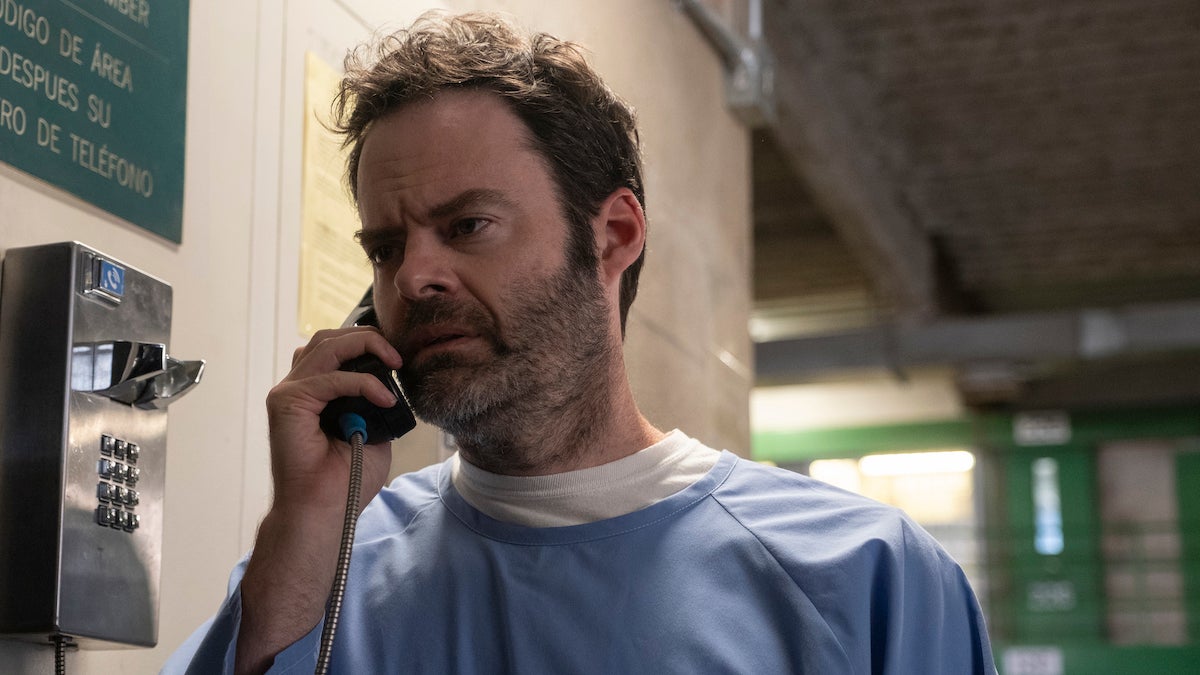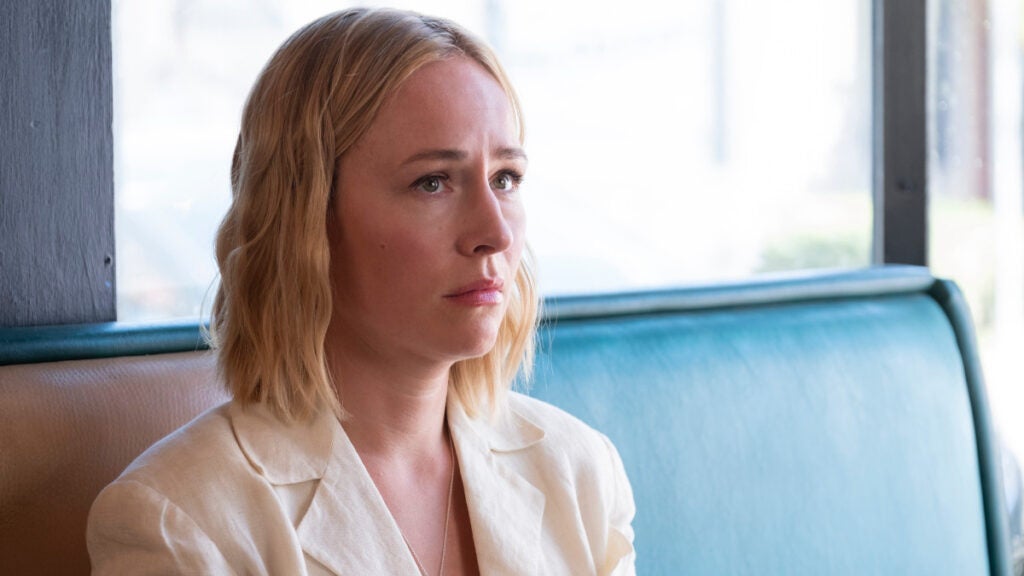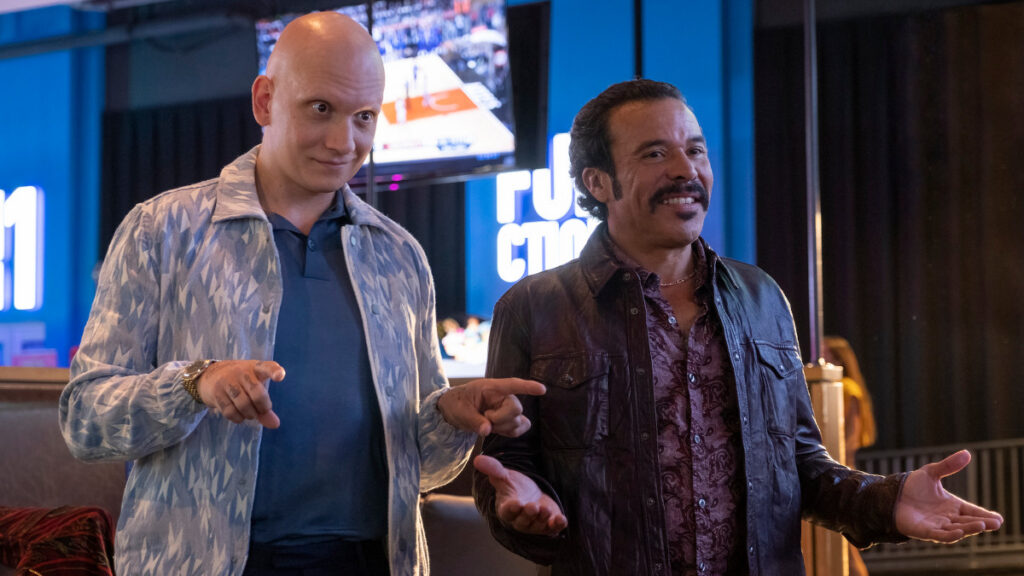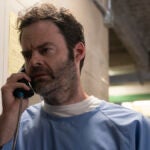
“Barry” is back, and the fourth and final season of the Emmy-winning HBO series picks up pretty immediately where Season 3 left off. Bill Hader’s hitman-turned-aspiring-actor is in prison for the murder of Janice Moss, and the revelation that Barry is a killer has reverberations for everyone on the show. The first two episodes of Season 4 premiered on Sunday night, and TheWrap spoke with Hader – who directed all eight episodes of this final season – about putting it all together.
In the following extended Q&A, Hader talks about the alternate opening scene that was considered for the start of Season 4, an abandoned idea that would have seen the specter of Barry’s father appearing throughout the premiere episode, putting together Sally, Fuches, Gene, Hank and Cristobal’s storylines for Season 4, and the suggestion from Paul Rudd that made it into the first episode. Hader also talks about crafting those two extended oners, thinking he broke his hand in the scene where he punched a wall and the thematic thrust of this final season.
Read the discussion below and check back every Sunday night as we’ll be breaking down each and every episode of “Barry” Season 4 with Hader right here.
Note: The following contains spoilers for “Barry” Season 4 Episode 1 and Episode 2.
How did you decide to begin the season immediately after Season 3 ended?
I think because we end Season 3 with a big cliffhanger, it’s just a question as to where everybody’s at. I think when we started the season we thought, “What’s the feeling of that?” I felt it was important to see everybody’s initial reaction, specifically Sally’s. It became very clear to me that Episode 1 needed to be everybody’s kind of dealing with their own personal fallouts, wins and losses from the end of Season 3, and Barry getting caught has to kind of affect that. So that was kind of the drive of it.
So Barry’s first phone call is to Gene, and he asks if he’s mad at him, which is very funny.
Yeah. “Did you trick me?” gets such a big laugh in the edit room, we all laughed so hard and no one ever laughs at that. Barry has become like Homer Simpson. He’s become just progressively dumber each season.
How did you hit upon the notion that Barry and Fuches would be in the same prison together?
That was a really interesting thing, the number of discussions and the amount of hand wringing and going back and forth and research and everything of what were the chances of them being put in the same prison? I actually went back and looked at it, the first iteration of Episode 1, the opening scene was Barry with his lawyer and the lawyer’s saying, “So this is what they’ve got on you,” and it basically was like “You’re f–ked.” And then it was him being transferred to another prison, and then when he’s transferred into that prison, you cut to him in the lunch room, and he’s eating at that prison, and then he walks by and then you reveal Fuches is in that prison. You do this a lot where you’re just trying to get the emotion right of Barry’s at a loss, and then that seems boring. So then there was another opening for the season that started with Gene Cousineau teaching the acting class. You see him on stage, and then he brings Barry up and he goes, “Barry, what scene are you going to do for us?” and then you see that the audience is basically every character that’s ever been in the show.
And Barry was basically apologizing and then in the middle of it he’s hit and you see that there are two security guards on stage beating him and you cut to the people in the audience watching it kind of like they’re watching a scene, like they’re kind of interested. And then they walk offstage and we push in on him, and the stage morphs into a jail cell. [HBO’s head of comedy] Amy Gravitt said, “This feels pretty didactic, Bill.” (Laughs) She said, “I feel like you kind of want to slow it down a bit. It’s the first episode, people need to get their bearings.” So then I went back and wrote the thing that you saw, which is we start with a press conference. He’s in jail and he calls Cousineau. The information that we were gonna get through in that scene with the lawyer we got through with him calling Cousineau and Cousineau just saying, “I got you.” So that’s basically how we got to the opening, but we didn’t really hit on that until Season 3 had completely aired.
I’m also curious how you guys hit upon Sally’s storyline. I love her freakout in the car with the button that she’s at a Sonic.
Yes, you and I being from Oklahoma, we understand how important Sonic is. The Sally storyline, it was very important to show she goes back home and so what’s that home life look like? And we had different versions of that, and like everything, we had too many scenes and then we just kind of honed it down to what you see. I remember we wrote a scene where she goes to her old high school and you see a big picture of her in “Cabaret” in high school and she was this big hit. And the teacher comes in and recognizes her and she takes the thing off the wall, so there was this whole thing like the town didn’t like her was one idea we had and it was just too much. So it was like let’s just get it down to, again, what’s the emotion? Initially, that scene wasn’t at a Sonic, it was at home and it was more on the nose kind of dialogue. Then you whittle it down to its bare essentials and then say, “What tells the story in an interesting way?” and let’s have her have a panic attack, and then her mom’s reaction just says a lot.
Everything with her parents is really revealing.
Yeah, she comes from a pretty nice house but is emotionally very locked off. I also like it when she goes, “Can I be alone?” and the dad goes, “Yep, I know the drill.” That just kind of gives you a lot of context on what her life was like and how she was treated by her folks. I think that the feeling that we got between those two is that they prove truly that the mother couldn’t handle having like an overdramatic daughter. And Sally just was ignored by her mother from a young age. I really like that scene where they get in a fight. A couple of people say that that’s a tough scene for them to watch.
Tell me about Hank and Cristobal in Santa Fe.
Yeah, they’re in heaven. They’re in their perfect place. It’s what they always wanted. That’s what interested me, let’s see these two guys having exactly what they wanted and they’re safe, and then almost immediately – much like Barry and Gene and Sally – they’re unable to turn off their nature. The woman mentions the sand and the wheels are spinning with them, they can’t help it. They’re criminals. Cristobal’s dream of having both things — legitimate and that you can be a crime lord and do this and also be in a loving, caring relationship. Early in the writing process, we said it’d be really interesting if Cristobal and Hank tried to recreate the thing they were doing in Season 2, the crime Utopia. And then we hit upon later that Hank is going back because Barry got caught.
I loved the rain stick at the restaurant.
That was Duffy Boudreau’s pitch, that that would be like playing the violin. That actor actually played all of “Pony” by Ginuwine on the rain stick and it was really great but it was just too long.
Seeing Barry kind of reckon with himself at the prison is really interesting. He says if he hadn’t tried to understand himself, they wouldn’t be there.
(Laughs) Yeah, “This is what introspection gets you.” I always thought it was funny, it’s a thing that can be relatable where you try to better yourself and then other things cause a chain reaction that blows up. It’s kind of like someone goes to therapy and then they realize, “Oh, my parents were really shitty to me,” and they stop speaking to them. His storyline and the Fuches storyline kind of bounce off each other. For Barry, the two people that he cares about more than anything basically told him to go f–k himself, and he goes back to the father that he felt was manipulating him, and in doing so gives Fuches the thing that helps him which is an apology. We knew early in that first episode, I think it always kind of stayed that Barry should apologize to Fuches. We cut a moment where initially, as written, when Barry saw Fuches he started chasing him in prison and Fuches was like, “Oh I’m about to get killed.” A kind of action scene where you’re like, “Oh, he’s about the killed” and then instead it was Barry chasing him to apologize to him, but it was really stupid. You don’t chase someone to apologize to them.
And then another thing I’ll tell you that we cut out was for a long time in the draft, the specter of Barry’s dad was in a lot of those scenes. So there was this ghost of Barry’s dad telling him where he f–ked up. It was very much supposed to be a nice companion to see Sally and her family then you saw Barry and his dad, and the dad we were looking for well-known actors to play that part. Then it became like, “These scenes are just someone telling Barry what to do.” The initial ending of Episode 1 for a long time was we had this thing of Sally walking away from him and then it was like someone from the acting class and they would kind of disappear into darkness and he didn’t see them again. And then you saw Fuches, he’s wearing a wire and he’s on some sort of duty thing mopping or whatever and Barry attacks him and starts beating him and he’s almost about to kill him and then you hear this, “Stop, Barry!” and he looks up and it was his dad. Like the specter of his dad saying, “Monroe has done so many great things” and all that stuff.
It was just really corny and did not work. It’s one of those things where you’ve got to write that stuff to kind of, at least in my experience, you write it to try to understand it and then once you get to that version and you live with it, you get sick of it. You go, “It shouldn’t be this,” and then by switching a couple of things and getting rid of the dad suddenly it worked. It’s a long road to make it simple, which is kind of a reoccurring theme.
What you got to is one of the most striking scenes of the series where Barry is at rock bottom in the bathroom, berating himself and acknowledging that he’s a bad person. What was it like shooting that?
Yeah, Jermaine, the guy who played the guard, I thought was just wonderful in that scene. He was a day player and that’s a tough position for an actor to be in to come in and deliver this big speech and you don’t know anybody. I thought he did such a good job, especially his face when he gets angry, I thought was just wonderful. But I think something that was interesting was that to see Barry at rock bottom. When I initially did that take, I thought it was good. And then (first assistant director) Gavin Kleintop and (writer/producer) Duffy Boudreau and (unit production manager) Aida Rodgers all kind of came into that set that we were in and they go, “We think we should go again,” and I was like, “Ugh.” I was so annoyed because I thought I did a good job (laughs). I think it was pretty over the top or something. Everybody’s usually like, “Oh let’s just go again” and Duffy, by virtue of being my friend for so long, he’ll be like, “It just feels like acting.”
So I went back and I was really annoyed and so I kind of was walking back and forth and then I started hitting myself. I could hear Wade Allen, our stunt coordinator, on the other side of the wall go, “There he is,” (laughs). And then I punched the wall and there’s actually a pad there – effects took it out. So I hit this pad and the minute I put my hand down on the sink as the guy is going, “Whoa, whoa, whoa, relax,” right then I thought I just broke my hand and that’s in the take we used. I’m like trying to stay in it but I’m going, “I think I just broke my hand.” My hand was just crazy swollen. It was like my ring finger and pinky were fused together, so for the rest of that scene, if you notice I’m on the ground and you cannot see my left hand because I’m hiding it.

Did you break it?
No I just hurt it. The actual term was, “You jacked it up.” And again, you see your influences where you do a thing and you’re thinking, “Man, this is really something, I’m really original here,” and then I’m like, this is like that scene in “Raging Bull” when he’s hitting the wall (laughs). But it was important to see him at his lowest point, and when there’s nothing left and no one left for him, he admits what he is. It’s a twofold thing. He admits what he is, but he also admits it in a way to get something, it’s a suicide-by-cop kind of thing. There was also a version where instead of hitting the wall, I was biting my finger. It was really crazy. Just to see him hurt himself and hating himself and he doesn’t want to live, and then it was really important to bring back that sound of the sky opening up. The “he’s going to die” moment. And then when he closes his eyes and he goes in his mind to a place where everything’s gonna be okay, it’s this kind of weird vision of him as a boy running and being free in this field.
Let’s talk about Episode 2, which reveals that Fuches knew Barry as a kid.
I think we kind of always knew that within the writers room. I told Stephen how to play it is I think you’re a guy that knows he’s probably never going to have kids and this is your buddy’s son and you like kids. And that’s how he played it and it was very sweet. I think that was always an important part of it, to really underline how much of a father figure Fuches is, and it also plays into other aspects that when you see the whole season will make more sense.
One of the best scenes is when Sally visits Barry in the prison, where he says “I didn’t lie to you. I didn’t tell you the part I didn’t want to be true.”
That’s a Liz Sarnoff line, she wrote that line and I went, “Oh my God, that’s the line.” I liked it being between the glass and on the phone where they’re static-y, it gives it this kind of otherworldly thing or this distance between them and they’re trying to connect but they don’t even sound the same and Barry’s beaten up. He looks hideous. The mask is off now, and this is the real him, this kind of weird, deformed guy.
My recollection of it was Sarah and I just went in and did it and we did not do a lot of takes. I think I did one close-up of both of us and maybe two takes of our wide shots. It was all very much clicking on the day and Sarah was unbelievable. What she does with the phone where she’s like, “You make me feel safe” and she kind of holds it out. That was great where she says that and Barry really latches onto that and she stands up and knows exactly where to stand so that half of her is in frame and half of her is out of frame. I’m so happy that Don, our camera operator, did not pan up with her. He let it cut off and it’s just her hand. I was so thankful, because any camera operator their job is to follow the actors, and he knew the power of it was to not see her face.
Tell me about putting together this incredible shot of this flashback that then turns into a wedding.
So I wrote a vision that Barry was having in prison and it was Sally and a kitchen and they have like a baby in a highchair and she says, “Oh, I made breakfast for you” and here’s the paper and all this stuff and he walks over and sits down in his prison uniform with his face all beaten up and it was kind of like, “Oh, this is the world that he can have after that talk with her and she said, ‘You make me feel safe.’” And again Amy Gravitt said, “We’re really spoon-feeding the audience here.” So I got that note really early and wrote what you saw. I don’t know why. I can’t really describe what that is. But a lot of Italian movies do that. It’s like a white blank space and you see like a party or something happening. Fellini movies and then also there’s a movie “The Night of the Shooting Stars,” these great Italian films, they tend to do that and I always liked that imagery.
So I’m sure it kind of came from that and then the idea of going into this wedding and then landing on Barry and Sally as an old couple. There’s something that just felt right about this idea of a future to get a life together. That he’ll be happy to grow old with somebody, and the idea that a wedding takes him there.
The way we shot that was that that’s two different shots put together in editing. So that’s a wall that we brought into a banquet hall into a hotel and we shot the people running against the wall and then it revealed them at the banquet hall and then the other one was then we went out to the desert like two months later, in Lancaster we shot the scene that you see with them coming towards you. The groom is Luca who’s my longtime stand-in on the show. He and the actress who plays the bride deserve so much credit because they were able to match their movements perfectly. Once they hit the wall and those sconce lights come on, they were able to match their movements perfectly.
Our cinematographer Carl (Herse) was concerned that it was going from bright daylight to a dark banquet hall, so we made a thing where there was a hallway that we brought all the way out there with lights and stuff. It was a lot of work to do that shot and then you have the sconces turned on and all that stuff, and then someone said, “What if they just come in and we just close a curtain behind them?” It was a pretty big team effort.

Where did the idea of Hank and Cristobal doing their big sitdown at Dave and Buster’s come from?
That was from me and Duffy Boudreau. I think initially it was going to be at just a warehouse. In the same writers meeting we came up with two things, we decided it would be more interesting if this was at a Dave and Buster’s, and then the other thing was when Gene first met with the Vanity Fair reporter it was initially at a restaurant. We were like, “This just seems really crazy because people would see them and he’s like notorious right now,” so that’s when we came up with the idea of the One-Man Show. And the scavenger hunt, that’s one of my favorite jokes – Duffy wrote that where he’s like, “How’d you get here, a rocket ship?”
I love the “Desperado” song playing at Gene’s show.
I was telling Paul Rudd about the show and I said there’s a scene where Henry Winkler gives a One-Man Show to one person and I said I’m trying to figure out a good song that can be playing as they’re waiting and he said, “Oh my God, you should have this children’s choir singing ‘Desperado.’” So he gave me that idea. And for Gene it’s like he couldn’t help himself. He can’t help his nature, and his nature is to be narcissistic.
Was the scene at Dave and Buster’s at the roundtable all one take?
Yes, all that is one take. That is Take Four where they were they nailed it. Anthony (Carrigan) and I both had the same idea at the same time, which was that he should run around to get back to his mark, which was really fun. And then like “The Untouchables” and Robert De Niro walking around the table, there’s always those scenes where they try to get the crime gangs together and they’re all at a table, like “The Godfather.” And then there’s always the guy who brought them together as always kind of walking around the table giving them a big speech about here’s what we have to gain if we all work together, but it was funny just to do it.
How did you go about putting together the whole FBI storyline?
I think the FBI thing came about because in reality, this is a very high-profile case. As we went through it, we said to ourselves, well Barry has killed high-profile people. He’s worked for different crime organizations. That’s something that would be helpful to the FBI. It was a lot of discussion to get to the simple thing of the FBI goes to Fuches. They’re like, we’ll give you a witness protection program and a deal if you get Barry on tape admitting to other crimes. And then Barry apologizes to Fuches and Fuches says, “F–k it. I love you. We’re together and we’ll be able to make this happen together.” And it’s the team back together and then Sally comes and instead of hating Barry, she says, “You make me feel safe.” So then Barry sees like, “Oh, there might be a chance of me having a real life.” So he takes Fuches’ deal, which we thought was very funny. It takes us such a long time to figure that out. But then once you figure it out it’s really simple and very funny, and it was emotional. That’s the thing, it’s all driven by emotion.
Then this other thing that starts to come up that was very conscious was this idea of everyone performing and how you perform in life. Having Cousineau literally perform for the Vanity Fair reporter. And when Sally gets there in the visiting room, she’s like, “Hi, how are you?” She’s performing, she’s trying to put on an act to get information. And Cristobal and Hank at Dave and Buster’s, they’re performing. And the lawyer, the first thing he says is, “What is this, an audition? I don’t do auditions.” So that was very conscious.
This interview has been edited and condensed.
“Barry” airs Sunday nights on HBO and HBO Max.
















